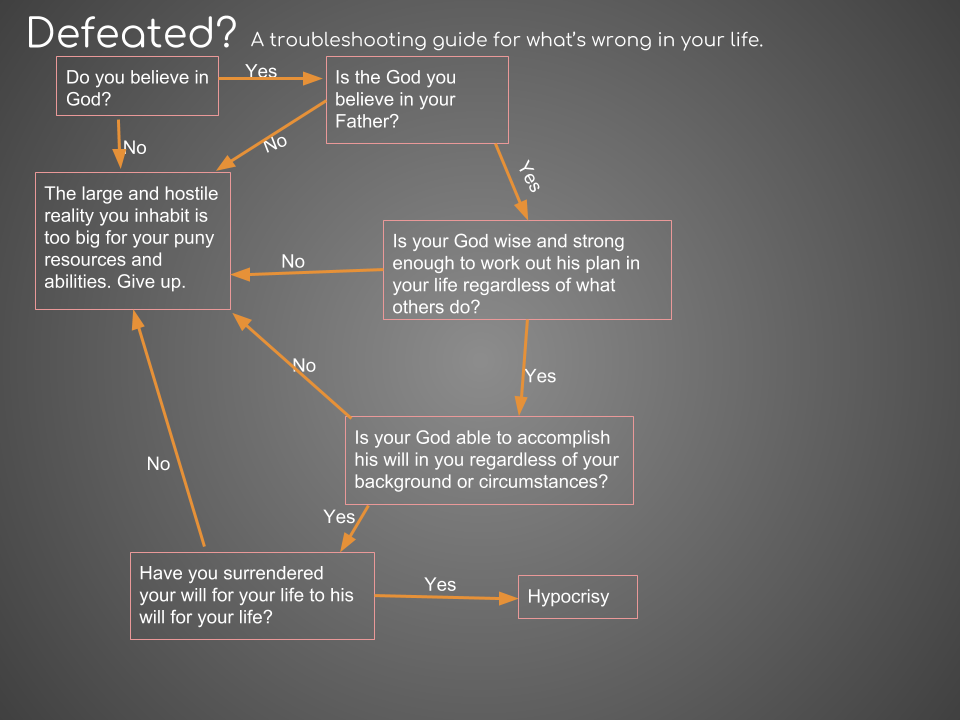I read a story today that made me weep tears of joy.
Kenda Creasy Dean in her book Almost Christian, urges the church to reclaim the unmixed gospel as the basis for teen discipleship. Why? Because of an ESPN article on high school football, that’s why!
Grapevine, Texas—one of Money Magazine’s top 100 “best places to live” in 20072—is almost 90% white, has a $90,000 median family income, and award-winning schools like Faith Christian School. Like most towns in Texas, Grapevine takes its high school football seriously. Faith’s football team, for example, has seventy players, eleven coaches, the latest equipment, and hordes of involved parents. In November 2008, the Faith Lions were 7–2 going into the game with the Gainesville State Tornados.
Gainesville State, on the other hand, headed into the game 0–8, having scored only two touchdowns all year. Gainesville’s fourteen players wore seven-year-old pads and dilapidated helmets and were escorted by twelve security guards who took off the players’ handcuffs before the game. Gainesville State, a maximum security prison north of Dallas, gets its students by court order. Many Tornados have convictions for drugs, assaults, and robberies. Many of their families have disowned them. They play every game on the road.
Before the game, Faith’s head coach Kris Hogan had an idea. What if, just for one night, half of the Faith fans cheered for the kids on the opposing team? “Here is the message I want you to send,” Hogan wrote in an email to Faith’s faithful. “You are just as valuable as any other person on Planet Earth.” The Faith fans agreed.
When the Gainesville Tornados took the field, they crashed through a banner made by Faith fans that read “Go Tornados!” The Gainesville players were surprised to find themselves running through a forty-foot spirit line made up of cheering fans. From their benches at the side of the field, the Gainesville team heard two hundred fans on the bleachers behind them, cheering for them by name, led by real cheerleaders (Hogan had recruited the JV squad to cheer for the opposing team). “I thought maybe they were confused,” said Alex, a Gainesville lineman. Another lineman, Gerald, said: “We can tell people are a little afraid of us when we come to the games. . . . But these people, they were yellin’ for us! By our names!” Gainesville’s quarterback and middle linebacker Isaiah shook his head in disbelief. “I never thought I’d hear people cheering for us to hit their kids. . . . But they wanted us to!”
At the end of the game (Faith won, 33–14), the losing team practically danced off the field with their fingers pointing #1 in the air. They gave Gainesville’s head coach Mark Williams what ESPN sportswriter Rick Reilly described as the first Gatorade bath in history for a 0–9 coach. When the teams gathered in the middle of the field to pray, Isaiah surprised everybody by asking to lead. (“We had no idea what the kid was going to say,” remembers Coach Hogan.) This was Isaiah’s prayer: “Lord, I don’t know how this happened, so I don’t know how to say thank You, but I never would’ve known there was so many people in the world that cared about us.”
As guards escorted the Tornados back to their bus, each player received a bag filled with burgers, fries, candy, a Bible, and an encouraging letter from a Faith player. Before he stepped onto the bus, Williams turned and grabbed Hogan hard by the shoulders: “You’ll never know what your people did for these kids tonight. You’ll never, ever know.” The Gainesville players crowded onto one side of the bus, peering out the windows at an unbelievable sight—people they had never met before smiling at them, waving goodbye, as the bus drove into the night.
Dean, Kenda Creasy. Almost Christian: What the Faith of Our Teenagers is Telling the American Church (pp. 85-87). Oxford University Press. Kindle Edition.
Our younger son, Jadon, is on a football team with a public junior high in “the hood.” I read the story to him and his sister this morning. As I read about the Gainesville team, he said, “That sounds familiar.”
I choked up as I read about the families from Faith Christian giving out the goody bags. Then, I looked up at Jadon and Lydia to say, “That’s the gospel. That’s the new thing that Jesus brought to the earth.”
On the way to school, Jadon told me that his “sketchy” friend Brandon got kicked off the team for lashing out at the opposing team after last week’s game. Jadon had previously told me some about Brandon’s home life. His dad’s out of the picture and his mother at least appears to be a meth addict. One time, when Brandon’s mom pulled to the curb to pick him up after practice, Jadon and some of his friends yelled after him, “We love you, Brandon!”
Brandon’s mom pointed at him through the car window and yelled, “Ha! I knew you were a f@ggot!”
It’s little wonder why Brandon flew off the handle last week.
I told Jadon that we should pray for Brandon and look for ways to remind him that he matters to God. By his quick agreement, I could tell that Jadon’s mind had already arrived there.
As believers in Christ, we’re called to live out the gospel. That simple story about how the Son of God came to live among us, die for our sins, rise again, and ascend to heaven to reign until his coming in judgment is pregnant with practical significance for every facet of human existence.
As a former legalist, I’ve learned that following a list of external rules, even an inspired one, leads to the fractured and frustrated disposition which the Bible calls, “death.” God didn’t nail the Torah requirements to the cross just to give us new written code in Matthew through Revelation. If he did, that would suggest that he had given Israel something faulty previously. The problem wasn’t with the specific commands, but with the very idea that commands could restore fallen rebels to a loving relationship with God and other people.
In Galatians 3:23-24, Paul speaks of the Mosaic law as a schoolmaster which superintended God’s people until the coming of “this faith.” Whatever “this faith” is, it made law obsolete. “This faith” can’t refer simply to belief in invisible realities since people living under the law possessed faith of that generic sort. “This faith” must be of such a quality that it can serve to direct human behavior in a way that the law prescribed but couldn’t accomplish in our rebellious hearts. So, what is “this faith”? Paul tells us several verses earlier:
For through the law I died to the law so that I might live for God. I have been crucified with Christ and I no longer live, but Christ lives in me. The life I now live in the body, I live by (the faith of -NAW) the Son of God, who loved me and gave himself for me. (Galatians 2:19-20)
I’ve changed the phrase in the parenthetical to more accurately reflect the original Greek from the NIV’s translation “faith in.” Paul’s original intent seems to be to convey that Christ’s faith by which he offered himself on the cross had been transferred to Paul through that very act. Because Christ died for Paul, Paul was now beholden live by the faith of Christ.
On the cross, Jesus fully revealed both the heart of God and the obligation of every human. Now, we look to the gospel to know in any situation how we should live. By faith we perceive the instructions of the gospel. By faith we obey them. This, and only this, is the Christian life.
The gospel proclaims the intrinsic worth of even the most vile offender. On that evening in Grapevine, TX, Coach Kris and the families of Faith Christian School obeyed the gospel. As my kids go to school and encounter punks, freaks, geeks, jocks, and goths, the gospel will tell them what to do. I pray they will listen and obey.
As we go into this week, we’ll run into people that we’d rather ignore. Will we live by some minimum standard or will we live by the faith of Christ?


 presence. Instinctively, I’d flip the switch on the wall, but the light wouldn’t respond. Fear would grip my heart as I vainly repeated my attempts to shed light on whoever or whatever approached me in the darkness. It’s been quite some time since I’ve had that dream, but it still haunts me whenever I read Jesus’ words recorded in Matthew 6:22-23.
presence. Instinctively, I’d flip the switch on the wall, but the light wouldn’t respond. Fear would grip my heart as I vainly repeated my attempts to shed light on whoever or whatever approached me in the darkness. It’s been quite some time since I’ve had that dream, but it still haunts me whenever I read Jesus’ words recorded in Matthew 6:22-23.

